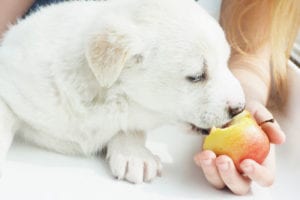5 Holiday Food Safety Tips for Pets

‘Tis the season for family, friends, and of course…FOOD! While you’re busy cooking and baking, keep an eye on your pet. Some “people food” contains ingredients that can actually be toxic to pets, causing them to become sick or worse. Animal Emergency Center of Tulsa recommends that you consider the following five holiday food safety tips to keep your pet happy and healthy this holiday season. And remember, we’re open 24 hours a day, 7 days a week for emergency care, should an accident occur.
- Use Caution If Feeding Your Pet Turkey
Protein is an important part of everyone’s diet, including your pet, so a lean meat like turkey (fully cooked, of course) is usually a safe food to feed to your four-legged friend—if you feed your pet table food, that is. White meat is the safest option, since it contains less fat. Just be sure to remove any bone fragments first, as they can cause choking or gastrointestinal problems if your pet ingests them. Also make sure there isn’t any gravy on the turkey.
- Know Which Fruits & Veggies Are Safe
Lucky for you and your pet, turkey isn’t the only food that’s safe for pets to eat. As you know, fruits and vegetables are rich in vitamins and fiber, making them a healthy choice for your pet, but not ALL fruits and vegetables are safe. Some of the ones that are safe include raw veggies like carrots, celery, and cucumbers and fruits like apples and blueberries. On the “no-no” list is grapes, which are toxic to pets. Just make sure to chop any fruit or veggie in small bite-sized pieces before giving them to your pet.
- Don’t Share Your Dessert With Your Pet
Despite how sweet and sad those big eyes look as your dog begs for a taste of your chocolate brownie, don’t give them any chocolate. Chocolate contains an alkaloid called theobromine that’s poisonous to dogs and cats. The sugar substitute xylitol, which is common in certain gums and candies, is also toxic, so avoid giving your pet any sweet food altogether to be on the safe side. If you ever suspect that your pet has eaten chocolate or any other toxic food (toxicity symptoms include vomiting and diarrhea), contact Animal Emergency Center of Tulsa as soon as possible at 918-665-0508.
- Avoid Feeding Your Pet Garlic
Garlic, chives, onions, and leeks are all part of the allium family, and all of which are mildly or moderately poisonous to dogs and cats. Toxicity symptoms can range from vomiting, diarrhea, and gastroenteritis. With that in mind, these foods are also definitely on the “no-no” list when it comes to sharing your food with your pet.
- Keep Your Garbage Can Sealed
Your pet’s sense of smell is a lot stronger than yours, so while you’re busy entertaining your guest, your pet might go digging through your trash for scraps if the bag isn’t properly sealed. Always make sure the garbage can lid is secured as well, and when the trash gets full, take the bag outside to eliminate your pet’s temptations.
If you have any questions about toxic and non-toxic foods for pets, or if you think your pet may have eaten a toxic food, call Animal Emergency Center of Tulsa at 918-665-0508. We’re available 24/7 to assist you and your pet. We hope you have a safe, happy holiday season with your family and four-legged friend.
